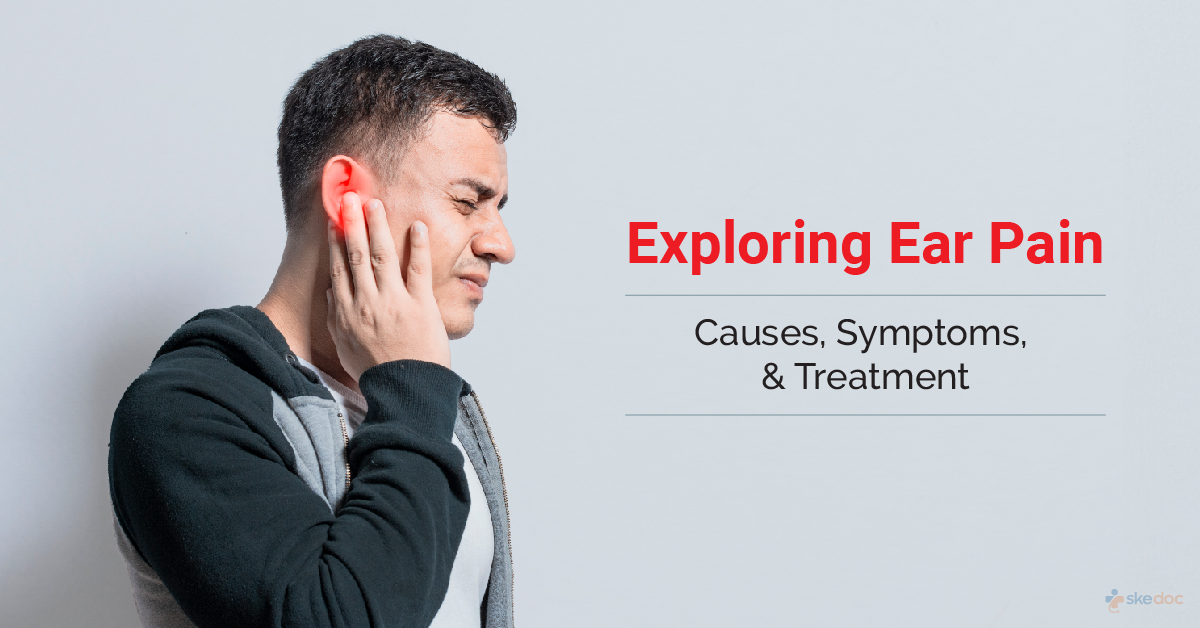Allergy
Blood Diseases
Bone & Joints
Brain
Cancer
Child Care
Cosmetic Surgery
Diabetes
Endocrinology
ENT
Eye
Gen Medicine
General Surgery
Heart
Kidney
Lifestyle
Liver & Digestive
Lung
Men’s Health
Mental health
Physiotherapy
Rheumatology
Skin and hair
Sleep Disorders
Spine
Transplant
Women Health
Thyroid
Vascular Surgery
Ear Pain

What is Earache?
Earache or otalgia is pain that is felt in the ear and may originate from within the ear or from a location outside the ear.
Is the ear pain condition a Medical emergency?
It is not a medical emergency, but seeking early medical attention is always advisable.
Types
It may be of the following types:
- Primary otalgia: The origin of the pain is from within the ear
- Referred otalgia: The origin of the pain is outside the ear, but the pain is felt within the ear
Causes
A number of conditions can cause ear pain. Some of them are as follows:
Primary otalgia:
- External ear causes:
- Trauma
- Auricular cellulitis
- Infection of the perichondrium surrounding the ear cartilage
- Otitis externa (swimmer’s ear): Infection of the external ear canal, mostly due to staphylococcus aureus
- Mechanical obstruction due to earwax impaction or foreign bodies
- Herpes zoster affecting the external ear
- Tumors (squamous cell carcinoma) of the external ear canal
- Middle ear:
- Acute otitis media: Infection of the middle ear
- Barotrauma
- Eardrum rupture due to Trauma
- Any upper respiratory infection
Referred otalgia:
- Dental pain
- Sinusitis
- Eustachian tube dysfunction
- Inflammation of the joints of the jaws
- Myofascial pain syndrome
- Bells palsy
- Trigeminal neuralgia
- Cancers of the oral cavity
- Inflammation of the salivary glands (parotid glands)
- Pharyngitis
- Laryngitis and laryngeal tumors
- Esophagitis
- Gastroesophageal reflux disease (GERD)
- Myocardial infarction, angina pectoris
- Temporal arteritis
- Spine trauma
Symptoms & signs
Ear Pain may be felt in one or both ears. It may be continuous or intermittent. In addition to pain, some other symptoms that may be seen include:
- Ear discharge
- Tinnitus (ringing in the ears)
- The fullness of the ears
- Dizziness
- Fever
- Hearing loss
Investigations
Most of the time, it does not require any investigations and only requires direct ear examination with a headlight, otoscope, or endoscope by an ENT specialist.
- Laboratory tests: Depends on the preliminary assessment
- Nasal endoscopy
- Otoendoscopy
- Audiometry
- Eustachian tube function tests
- Imaging tests:
- Dental radiography
- CT scan of the nose and sinuses
- OPG To assess temporomandibular joint dysfunction
- PET scanning: If tumors are suspected
Diagnosis
A diagnosis of the underlying cause is established based on medical history, clinical evaluation, and results of the investigations done.
Treatment options
The treatment of Ear Pain depends on first identifying and treating the underlying cause. It may include medical and surgical management or conservative therapy as required.
Medical management
Medical management of ear pain may include:
- Broad-spectrum antibiotics: For the management of bacterial infections
- Antivirals: For the management of viral infections such as herpes simplex, etc
- Antifungals: For the management of fungal infections
- Antacids: For the management of GERD
- Analgesics: For relief from pain
Interventional including surgery and indications for surgery
Rarely, surgical intervention may be required to manage the underlying cause.
Complications
Untreated middle and external ear infections that are causing otalgia may sometimes lead to complications due to spreading infection( such as brain abscess, meningitis, epidural abscess, permanent hearing loss, etc.)
Prognosis
The prognosis depends on the underlying cause. Most causes of earache are mild and not life-threatening.
When to contact the doctor or hospital? / How to identify the emergency or complications?
It is advisable to seek medical attention if there is a persistence of otalgia.
Indications for hospitalization if required
Hospitalization is not required to manage earache unless surgical interventions are advised.
Suggested clinical specialist/ Departments to consult for this condition
- ENT
Was this article helpful?
YesNo
Comments





